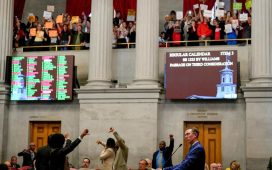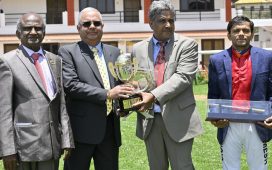United States Capitol in Washington, D.C.
The future of horse racing will be in jeopardy if Congress doesn’t pass the Horseracing Integrity Act.
The future of horse racing will be in jeopardy if Congress does pass the Horseracing Integrity Act.
Those were the mixed messages heard by Members of the U.S. House of Representatives’ Committee on Energy and Commerce’s Subcommittee on Consumer Protection and Commerce on Tuesday during a hearing in Washington, D.C., entitled “Legislation to Promote the Health and Safety of Racehorses.”
At one extreme was former Maryland Jockey Club racetrack owner Joe De Francis, now chairman of the National Horseracing Advisory Council of the Humane Society of the United States. De Francis described racing’s credibility problems on equine safety and integrity issues as “a growing tsunami … about to crest and destroy us.”
At the other extreme was Dennis Drazin, CEO of Monmouth Park in New Jersey, home district of Energy and Commerce Committee chairman Frank Pallone Jr. “If you ban Lasix,” Drazin told Pallone and other Members, “my track, Monmouth Park, probably won’t survive.”
A ban on the race-day use of the diuretic Lasix is the most controversial component of the Horseracing Integrity Act, which would establish an independent, non-governmental organization under the umbrella of the United States Anti-Doping Agency (USADA) to regulate medication policy in horse racing. But the race-day ban of that drug is not the only reason the bill was opposed by some of the witnesses who testified against the bill.
Drazin, who led the fight that eventually saw the Supreme Court strike down a federal ban on sports betting, predicted that – if passed into law – the legislation would be challenged as unconstitutional.
As an alternative to the Horseracing Integrity Act, Drazin said he is working with a group of nearly 30 people through a National Thoroughbred Racing Association committee to draft separate legislation because he doesn’t think the Horseracing Integrity Act goes far enough. Drazin said racing surface safety standards, portability of veterinary records and whip reform are among items missing from the bill.
“We need a commissioner who is empowered,” said Drazin. “That’s the key word – empowered – but we haven’t been able to accomplish that. And although I’ve been opposed to federal legislation, I want to be part of the solution, not part of the problem.”
William Lear, vice chairman of The Jockey Club and one of three trustees who run the Keeneland Association, said he helped draft the current bill before Congress and responded to a question from Rep. Greg Walden of Oregon by saying he believes the Horseracing Integrity Act would stand up to a constitutional challenge.
Several witnesses pointed out that efforts to draft uniform medication policies throughout the United States have failed. “We can’t solve this problem by ourselves,” De Francis said. “We have been trying for decades.”
Rep. Andy Barr, whose Congressional district includes many Central Kentucky horse farms and Keeneland, said that American racing has an image problem around the world. To his constituents, Barr said, “This reputational problem is a big deal.”
Rep. Paul Tonko of New York, who co-sponsored the Horseracing Integrity Act with Barr, asked “When is enough enough? The time for talk is done.”
During his prepared statement, Lear pointed out that “everyone in horseracing has to recognize that we are no longer debating solely within the confines of our industry. Our audience now, our jury of our peers, is the public at large and the news outlets that determine what they will see and hear.”
De Francis, during his testimony, explained why safety reform in his opinion isn’t just about the welfare of the horses but about the survival of the industry. “Horse racing faces greater competition than ever before for the entertainment dollar,” said De Francis. “The proliferation of technology and forms of entertainment and wagering is exploding before our very eyes. Our greatest asset, our greatest weapon in this competition is the athleticism and the nobility and majesty of the Thoroughbred racehorse.
“Survey after survey after survey has shown that not only the general public but our core fans are losing confidence to an increasing degree in our stewardship of the integrity of the sport and the fundamental integrity of our product,” De Francis said. “That we are doing our jobs properly and looking after the health and welfare and safety of these magnificent equine athletes that are the very foundation of our sport. You don’t need a PhD from a top 10 business school to know that if you lose the confidence of not only the general public but of your core customers in the basic product you are offering, the invisible hand of the marketplace is going to drive your business into oblivion.
“You won’t need to worry about remedies,” De Francis said. “The marketplace will take care of it and you’ll be out of business, just as many businesses like Ringling Brothers Circus that failed to follow the principles of Business 101 have suffered. So it is not an over-dramatization, it is not over-sensationalizing, to say that the very future of the industry, the survival of the business, is as stake.”
Rep. Jan Schakowsky of Illinois, who chaired the meeting, introduced dozens of letters into the record from both proponents and opponents of the bipartisan legislation that now lists a majority of House members as co-sponsors.
Following are links to:
HB 1754 – Horseracing Integrity Act
Witnesses
Dr. Kathleen M. Anderson, Equine Veterinarian
Testimony
Joseph A. De Francis, Chairman, National Horseracing Advisory Council of the Humane Society of the United States
Testimony
Dennis A. Drazin, Chairman and CEO, Darby Development, Operator, Monmouth Park Racetrack
Testimony
Marty Irby, Executive Director, Animal Wellness Action
Testimony
William M. Lear, Jr., Vice Chairman, The Jockey Club
Testimony
Edward J. Martin, President and CEO, Association of Racing Commissioners International, Inc.
Testimony
Christopher J. McCarron, Hall of Fame Jockey, Retired
Testimony
Following the House Energy & Commerce Subcommittee on Digital Commerce and Consumer Protection’s hearing on the Horseracing Integrity Act this morning, the Thoroughbred Safety Coalition issued the following statement:
“The Thoroughbred Safety Coalition’s top priority is the wellbeing of our athletes, both equine and human. To this end, we welcome and applaud all ongoing efforts to increase the safety and integrity of our sport. While lawmakers work through the lengthy legislative process, the Thoroughbred racing community must work together to advocate for and implement meaningful reforms in racing jurisdictions across the country. It is our responsibility to ensure the horses that make our sport so special are racing under the safest and most transparent conditions possible. We can and must act quickly.
“That’s why leading racetracks and key stakeholders, including Breeders’ Cup Limited, Churchill Downs Incorporated, Keeneland Association Inc., the New York Racing Association Inc. (NYRA), Del Mar Thoroughbred Club and The Stronach Group, along with the American Association of Equine Practitioners (AAEP), Dixiana Farm, the Kentucky Thoroughbred Association (KTA), Mt. Brilliant Farm, the National Thoroughbred Racing Association (NTRA), Stonestreet Farm, the Thoroughbred Owners and Breeders Association (TOBA) and the University of Kentucky, have united in an industry-led effort to advance safety measures. Together, we can enact meaningful change with immediate effect.
“Through increased medication restrictions, expanded veterinary examinations, stricter transparency and accountability measures, centralized and increased reporting requirements, data analysis, more consistent racing surfaces and additional operational reforms, the coalition will promote a culture of safety in Thoroughbred racing. The most powerful traditions are those that adapt. Change cannot wait.”
New to the Paulick Report? Click here to sign up for our daily email newsletter to keep up on this and other stories happening in the Thoroughbred industry.
Copyright © 2020 Paulick Report.







